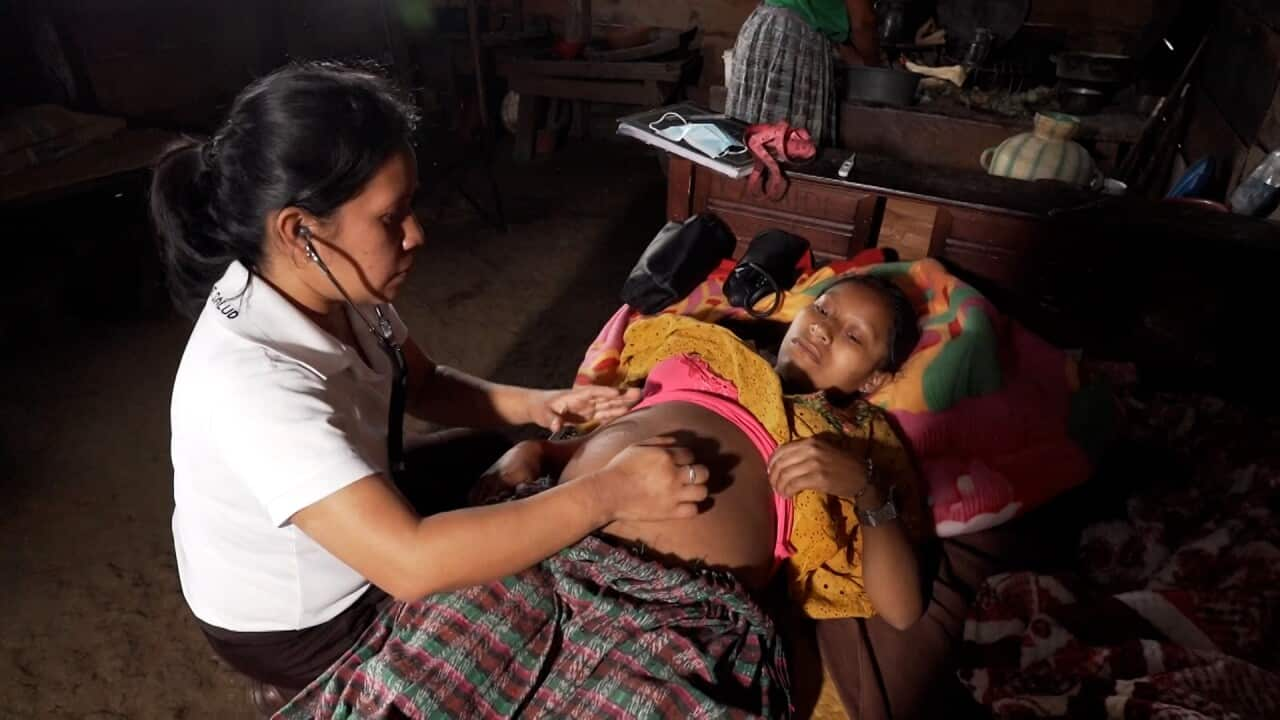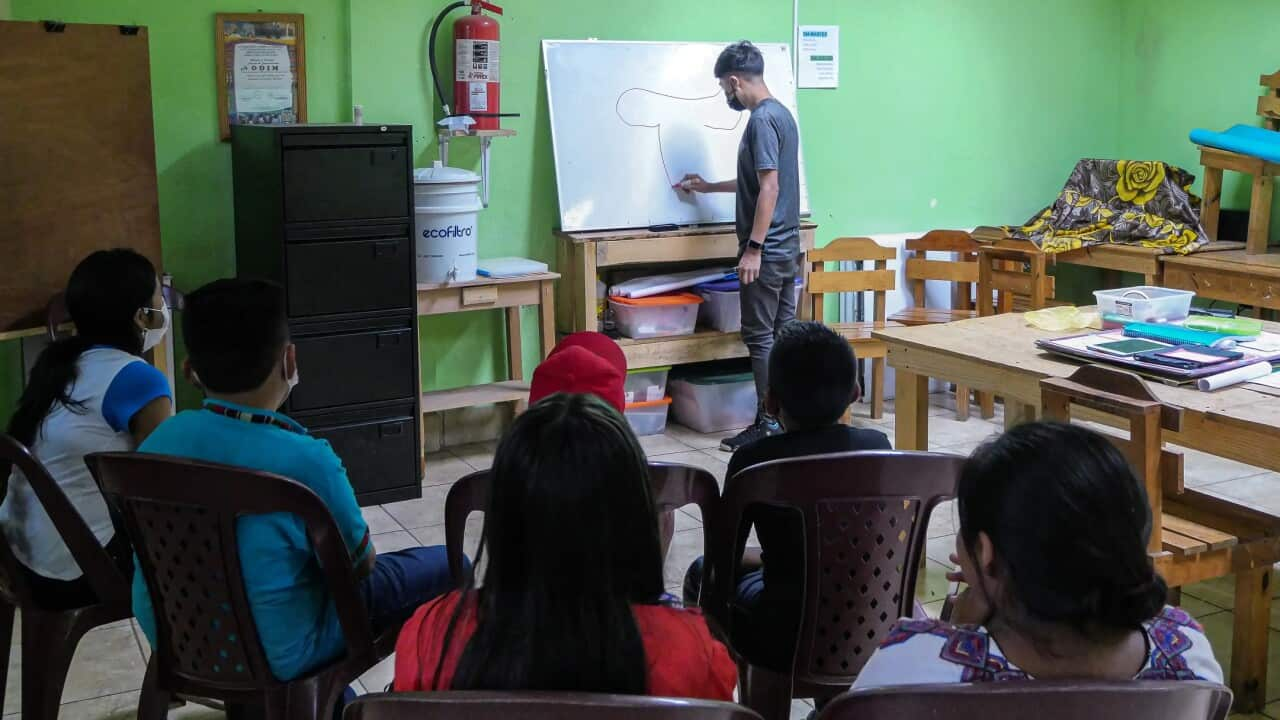Content warning: This article contains references to sexual violence against minors.
Angelina bathes her twin daughters with a bucket of water and a bar of soap.
Just a teenager herself, she was thrown into motherhood after her 54-year-old neighbour allegedly raped her when she was 12.
Now, she’s trapped living next door to him.
After Angelina and her mother reported the rape to the authorities, her alleged abuser paid about $750 to be released on bail.
He then returned to her village in Guatemala’s northern region of Alta Verapaz and built a property next door to Angelina’s family despite them having a restraining order against him.
“One day he may rape me again, that’s what I don’t want in my life,” she said. “That’s why I think about leaving, taking my children with me, but I don’t know where, and that stops me.”

Angelina speaks to a journalist. She reported her rape to the authorities and got a pro bono lawyer. She doesn't show her face because her case is still ongoing. Source: Supplied / documentary
The situation is particularly dire in Alta Verapaz, a remote mountainous region that is home to rural Indigenous communities, and where an overwhelming number of young girls fall pregnant as the result of rape.
Abortion is illegal in Guatemala so young girls like Angelina are forced to become mothers.
Angelina Law
Sexual violence is widespread in Guatemala. But even if the families of abused girls report it, the chances of getting justice are slim.
Only 3 per cent of reported sexual violence cases in Guatemala are investigated, and abusers can buy their freedom easily, according to Sexual and Reproductive Health Observatory (OSAR), a local organisation that supports girls who have been sexually exploited.
Angelina’s story was so shocking that a case worker with OSAR helped her find a pro bono lawyer. It has also inspired a campaign called ‘Angelina Law’ that lobbies for amendments to the national legislation to remove the option of bail for alleged rapists of children under 14.
Last June, a political party called Movimiento Semilla put forward the proposed legislation to the Guatemalan Congress. However, progress has been slow.
“The entire state has failed the girls. Not enough is done to prevent violence, attention to victims is insufficient and there are no guarantees of justice,” said Ligia Hernández Gómez, one of the Semilla members who presented the initiative at the Congress.
He raped me and marked my life forever.Angelina
Back in Alta Verapaz, Angelina lives in fear, awaiting a court date scheduled for 2025, six years after the event that changed her life.
Forced to leave school to support her daughters and earning $4 a day, Angelina can’t move.
“I want this man to go to jail. That’s why I reported it and struggle on with this process,” she said.
“It would make me very happy if he pays for what he did to me.”
Indigenous girls at risk
Carmelina Chocooj is OSAR’s only case worker in Alta Verapaz. She bridges the gap between Indigenous girls and the heathcare system that they often navigate for the first time.
One day, she brings a nurse along to a heavily pregnant 18-year-old, whose mother said she couldn’t afford to take her to a health centre. Another day, she takes a pregnant 14-year-old for an ultrasound. Both girls were raped.

Carmelina Chocooj, the only case worker with Sexual and Reproductive Health Observatory (OSAR) in Alta Verapaz, talks about the plight of young Indigenous girls who are sexually assaulted. Source: Channel 4 / documentary
“When girls are left alone in their homes, many men realise that mum and dad are not there and they go to assault the girls,” she said.
“The homes are spaced out, one here, one there and so on. If a man arrives to assault a minor, why would she scream? No one’s going to hear her.”
According to OSAR, between January and March this year, there were 2,171 registered births from mothers between the ages of 10 and 19 in Alta Verapaz, making it the highest child and teen pregnancy rate in the country.
She is a little girl who should have all the future to play, to joke, to laugh, to go out, free of responsibility, but no.Carmelina Chocooj
But Ms Chocooj says the government isn’t doing enough and the normalisation of sexual violence against Indigenous women has been deeply rooted in Guatemalan society since the civil war.
During the 36-year armed conflict, which ended in 1996, the Indigenous Maya population was subjected to mass killings, rape and other atrocities that amounted to genocide.
In a historic verdict in January last year, Guatemala’s highest court sentenced five former paramilitary members to 30 years each in prison for crimes against humanity for the rape of 36 Maya Achi women in the early 1980s.

A community project Na’leb’ak teaches Indigenous girls in rural Guatemala about their rights, sexual consent, and reproductive health. Source: Channel 4 / documentary
Need for more support
Ms Gómez says the country needs comprehensive sexual education and culturally relevant resources.
“There is no linguistically and culturally relevant attention in the clinics, prosecutors' offices and courts, which is serious for a majority of Mayan-speaking girls who do not speak any Spanish at all,” she said.
“Justice is not only about punishing the aggressors but also about restitutive measures that allow girls to rebuild their lives.”
A grassroots organisation Na’leb’ak is working to address this issue in Alta Verapaz, educating Indigenous girls about their rights and reproductive health and teaching them how to grow crops to sell to become independent.
But most girls in poor rural communities have no access to any kind of support.
“It’s an overwhelming feeling. Because it’s not just one, there are so many of them,” Ms Choccoj of OSAR said.
“She is a little girl who should have all the future to play, to joke, to laugh, to go out, free of responsibility, but no.”
If you or someone you know is impacted by sexual assault, call 1800RESPECT on 1800 737 732 or visit . In an emergency, call 000.












